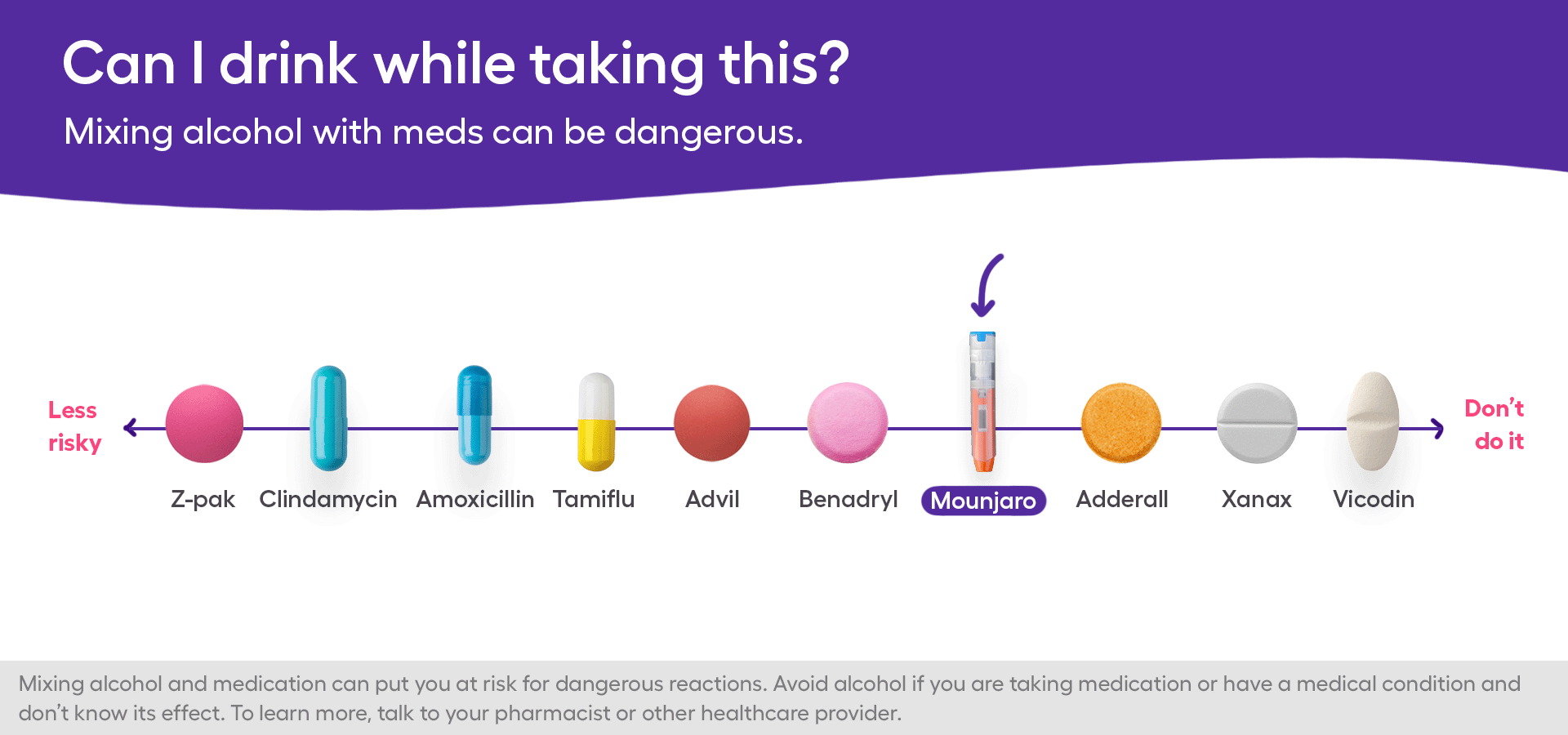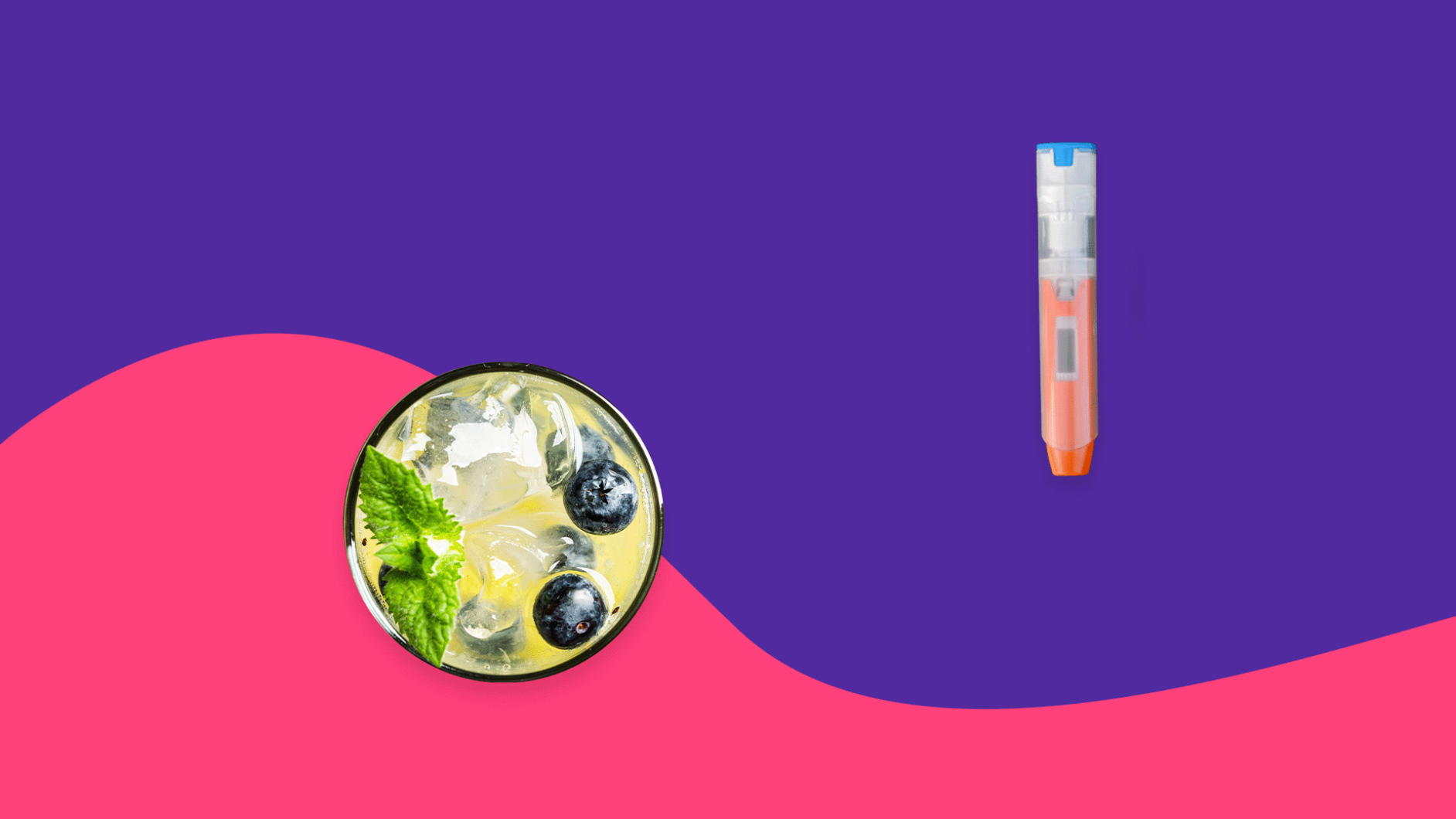Key takeaways
Mounjaro (tirzepatide) and other GLP-1 agonists are effective in managing blood sugar levels for Type 2 diabetes and have shown promise for weight loss.
While there are no direct drug interactions between Mounjaro and alcohol, combining them can lead to blood sugar fluctuations and increased side effects, such as nausea and indigestion.
Drinking alcohol in moderation while taking Mounjaro may not lead to serious side effects for some.
Some individuals taking GLP-1 medications like Mounjaro have reported a reduction in alcohol cravings, potentially leading to fewer drinks consumed.
Consult a healthcare provider before consuming alcohol with Mounjaro.
Mounjaro is a medication manufactured by Eli Lilly and approved by the U.S. Food and Drug Administration (FDA) to treat Type 2 diabetes. Tirzepatide is the active ingredient of Mounjaro, which is classified as a brand-name dual glucose-dependent insulinotropic polypeptide (GIP) and glucagon-like peptide-1 (GLP-1) receptor agonist. It helps manage high blood sugar levels by increasing insulin production and stopping the liver from producing excess sugar. In some cases, Mounjaro may be prescribed off-label for weight loss.
When living with diabetes or trying to lose weight, there are special considerations around alcohol—how it affects your blood sugar and your waistline. If you’re taking this medication, you might wonder, is it safe to mix Mounjaro and alcohol? In general, it’s best to limit alcohol consumption due to the potential risk of increased side effects and other problems—namely, how alcohol can affect glucose (blood sugar) levels and potentially lead to complications when combined with tirzepatide medications.
Continue reading to learn what happens if you combine alcohol and Mounjaro, the potential risks, and how much alcohol may be safe to drink.
Save up to 80% on Mounjaro with SingleCare Different pharmacies offer different prices for the same medication. SingleCare helps find the best price for you.
Effects of Mounjaro and alcohol
There are no direct drug interactions for the combination of Mounjaro and alcohol, but that doesn’t mean it’s a good idea to mix the two. Here are some possible negative effects of drinking alcoholic beverages while on Mounjaro.
Keep in mind that Mounjaro is injected once weekly because the medication stays in your system for around one week. Just because you’re not drinking on the day you took the injection doesn’t mean it’s completely safe to drink alcohol.
1. Blood sugar fluctuations
Alcohol can cause low blood sugar, so if you’re taking medication to control your blood glucose levels, you may experience hypoglycemia, which can become dangerous and life-threatening. Symptoms of low blood sugar vary in severity but can include confusion, drowsiness, dizziness, shakiness, sweating, chills, nausea, and headaches.
Different factors may affect the impact alcohol has on blood sugar levels, such as how much alcohol you consume and whether you have eaten recently. For example, consuming alcoholic drinks on an empty stomach may cause an increased risk of hypoglycemia, while drinking long-term may lead to hyperglycemia (high blood sugar levels), which can make it hard for people with diabetes to control their blood sugar.
2. Worsening side effects
Drinking alcohol may increase the risk of side effects. Mounjaro and alcohol may have overlapping side effects, including upset stomach, nausea, and indigestion. These side effects may be particularly worse after drinking large amounts of alcohol while on high doses of Mounjaro. For some people, moderate alcohol consumption while using Mounjaro may not cause serious side effects. Drinking in moderation means limiting alcohol intake to no more than two drinks per day for men or more than one drink per day for women.
3. Reduced weight loss
Alcohol can be problematic if you’re taking Mounjaro or similar drugs for weight loss. For example, drinking lots of empty calories can counteract your weight loss goals. Imbibing also stimulates your appetite and makes you more likely to opt for calorie-rich, less-healthy options. And when you consume alcohol, your body prioritizes breaking it down over fats and carbohydrates—which can slow your metabolism and prevent fat-burning.
4. Potential liver problems
People with a history of chronic alcohol use or alcohol use disorder may need to use Mounjaro with caution. Although Mounjaro isn’t known to cause liver injury, heavy alcohol use is linked to liver problems. An increase in liver enzymes was observed in less than 1% of patients taking Mounjaro. However, a small percentage of people taking Mounjaro have experienced gallbladder disease, which may affect the liver’s functioning.
5. Decreased desire to drink
Although not necessarily a negative effect, it’s possible that Mounjaro may reduce your desire to drink. While Mounjaro isn’t specifically indicated for this purpose, some individuals have reported craving fewer drinks while taking the medication. Scientists with the Fralin Biomedical Research Institute analyzed alcohol-related posts on social media and found that individuals taking GLP-1 drugs experienced a reduction in their average number of drinks and odds of binge drinking.

Side effects of Mounjaro and alcohol
While Mounjaro treatment is generally well-tolerated by most individuals, it’s important to be aware of possible side effects that could overlap with alcohol. Some side effects of Mounjaro may be mild and temporary, especially when starting treatment. Other side effects can be serious, especially when drinking alcohol, and require medical attention.
The most common side effects of Mounjaro that may overlap with alcohol include:
- Nausea
- Vomiting
- Diarrhea
- Constipation
- Decreased appetite
- Abdominal pain
Mounjaro may also cause serious side effects that may overlap with those of alcohol or be worsened by alcohol, such as:
- Inflammation of the pancreas (pancreatitis)
- Severe allergic reactions
- Low blood sugar (hypoglycemia)
- Kidney problems, including kidney damage and failure
- Vision problems
- Gallbladder problems
It’s important to note that Mounjaro has a boxed warning, the most serious warning issued by the FDA, indicating an increased risk of thyroid cancer. In animal studies, tirzepatide has been shown to cause thyroid C-cell tumors. However, no specific clinical trials have shown that Mounjaro causes thyroid C-cell tumors, including medullary thyroid carcinoma (MTC), in humans. The risk of these tumors may depend on the dosage given and how long the treatment lasts
Additionally, tirzepatide is contraindicated in patients with a personal or family history of MTC or in patients with Multiple Endocrine Neoplasia syndrome type 2 (MEN 2). It’s a good idea to speak with a healthcare professional if you have other health conditions, including diabetic retinopathy (nerve damage) or kidney problems. You should also seek medical advice if you take other medications, including over-the-counter medicines, supplements, and birth control pills, before mixing Mounjaro and alcohol.
Can you drink alcohol while taking other diabetes medications?
People who use Mounjaro may also be taking other medications as part of their diabetes treatment plan. Therefore, it’s important to understand these possible interactions before consuming any amount of alcohol. Alcohol can negatively interact with many diabetes medications, leading to side effects or serious complications. Examples of diabetes medications that alcohol can interact with include the following.
Insulin
It’s important for people with diabetes who take insulin to monitor their blood sugar levels closely and avoid consuming large amounts of alcohol. Alcohol can increase the risk of hypoglycemia when taken alongside insulin, which may lead to symptoms such as dizziness, confusion, and even loss of consciousness.
Sulfonylureas
Combining sulfonylureas with alcohol can increase the risk of hypoglycemia because both sulfonylureas and alcohol can decrease blood sugar levels. Sulfonylureas include Amaryl (glimepiride), DiaBeta (glyburide), and Glucotrol (glipizide).
Metformin
Alcohol may increase the effects of metformin on lactate levels, which can lead to an increased risk of lactic acidosis. Lactic acidosis is a rare but serious side effect of metformin that can cause symptoms such as muscle pain, weakness, and rapid breathing. In addition, drinking alcohol and taking metformin could lead to an increased risk of hypoglycemia.
Thiazolidinediones
Alcohol consumption may increase the risk of liver damage, especially when taking thiazolidinediones for diabetes. People who take thiazolidinediones, such as Actos (pioglitazone) and Avandia (rosiglitazone), may need to avoid consuming large amounts of alcohol and monitor their liver function with a doctor or other healthcare provider.
Drinking alcohol can worsen blood sugar control. Therefore, drinking alcohol with any diabetes medication may cause problems. In general, it’s not recommended to drink excessive amounts of alcohol while treating diabetes. However, as everyone is different in how they respond to diabetes medications and alcohol, a healthcare provider may allow drinking in moderation while taking diabetes medications.
The bottom line
While moderate alcohol consumption may be feasible for some individuals on Mounjaro, it’s crucial to be cautious when mixing the two. The combination may cause blood sugar fluctuations, intensified side effects, and even interference with your weight loss goals. Always consult your healthcare provider before consuming alcohol with diabetes, particularly if you have other medical conditions or are taking other medications. That way, you can make the best decisions for your health.
- Drinking alcohol only in moderation, U.S. Department of Health and Human Services (2024)
- Weight loss and alcohol, Mount Sinai (2024)
- Stimulation of appetite by alcohol, Physiology & Behavior (2001)
- Tirzepatide, National Library of Medicine (2022)
- Buzz kill: Virginia Tech researchers find drugs used to treat Type 2 diabetes reduce alcohol cravings, use in individuals with obesity, Virginia Tech News (2024)
- Mounjaro highlights of prescribing information, U.S. Food and Drug Administration (2023)






